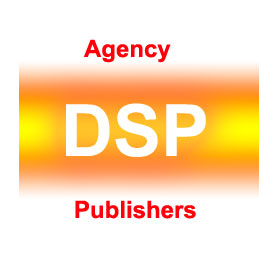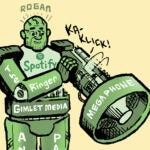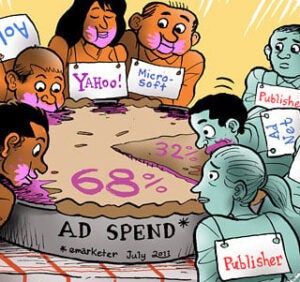Here’s today’s AdExchanger.com news round-up… Want it by email? Sign-up here.
Web publishers fear agency demand-side platforms – that’s what the headline says anyway in a Mediaweek article by Mike Shields. Not all publishers were willing to go “on the record” for Shields regarding their concerns, but their hesitancy is based in part on past experience with ad networks. A juicy nugget within the article: according to Shields, a group of large publishers met with Rubicon Project last week to discuss evening up the score with “a selling platform through which sites could set rules on pricing, transparency and data.” Read more.
More IPO Talk
As originally reported by TechCrunch Europe, Linkedin is the latest private company to consider an initial public offering in the digital media space. The Deal’s Mary Kathleen Flynn looks at the rounds of funding that Linkedin has raised to date ($103 million total) and a hurdle that LinkedIn may be on the verge of climbing – “there hasn’t been an IPO in the U.S. from the post-2004 Web 2.0 social media generation yet.” Read more.
Anteing Up For Ads
The Wall Street Journal’s Emily Steel writes about the IAB and advertising industry’s efforts to dispel consumer concerns about online advertising and behavioral advertising, specifically. Steel says that a new ad campaign will educate consumers as well as offer a “heads up” through a badge which would tell consumers that their activities are being tracked by a cookie in their browser. Read more.
This Lawsuit May Have Teeth
Eliot Van Buskirk of Wired writes that a teeth whitening company “that admittedly used deceptive ad campaigns to trick users into signing up for expensive subscriptions” has now turned the tables on Google, Yahoo! and Microsoft and is suing for alleged unauthorized use of its trademark. The story brings to light the “negative option” technique which requires users to unsubscribe from a subscription after accepting a free trial. Read the article.
Black Friday Was Big
ComScore has somehow been able to tabulate the results for “U.S. Online Holiday Spending” for last Friday – Black Friday. The results are encouraging according to the audience research firm as Americans spent 11% more this year (or $595 Million total) than during the previous year’s Black Friday. Read the release.
AdExchanger Daily
Get our editors’ roundup delivered to your inbox every weekday.
Daily Roundup
The Big Prospects List
If you’re looking to find out where the money is in terms of marketers with deep pockets, the editors of Ad Age have kindly just released their latest spend report, “Global Marketers 2009”. It’s all the names you know with 100s of millions of dollars of marketing spend – if not billions. Read a summary from Laurel Wentz and Bradley Johnson here. And, see the list here.
Bigger Display In Search
Is a 728×90 display ad next? The Google AdWords blog announced that it has added “product extensions” (see example) to the AdWords toolkit. Similar to functionality of the recently announced Ad Sitelinks, Google’s Dan Friedman writes about product extensions, “When your AdWords text ad appears, and your Google Merchant Center account contains products that are relevant to the searcher’s query, product extensions show the images, titles, and prices of your products in a plusbox under your ad.” Read about it.
No Advertising Spat
On the Traffick blog, Andrew Goodman takes anti-advertising arguments to task – specifically Reaction Wheel blog’s Jerry Neumann (Neumann is angel investor in Domdex, 33Across and CPM Advisors among others). Goodman says Neumann has erroneously suggested in a recent blog post that one day there won’t be a need for advertising. Goodman writes, “For a mature executive not toting a can of spray paint, that’s pretty childlike. I guess the purpose is just to get attention. It’s valuable, after all! And in an attention economy, can you logically even conceive of no advertising? Not even remotely.” Read more.
Impressions Double, Revenues Still Hurting
ClickZ’s Christopher Heine reports that Monster Worldwide’s ad network has clearly benefited from the recession as the unemployed head to websites on the Monster network. According to Heine the company recently stated that impressions are now double what they were a year ago. Still, revenues at Monster cratered to $692 million during the first nine months of 2009 compared to the $1.05 billion in the same period a year earlier. Scarcity matters? Read more.
TV Up, Online Down?
The Los Angeles Times’ Meg James says that TV advertising is enjoying a resurgence as anecdotal evidence suggests that “significantly higher prices” are appearing to as little as five months ago. According to James, the “scatter” mark and Q4 marketer demands are driving deals. James also quotes Greg Kahn, SVP at Optimedia who says “There is so much clutter in the [internet display advertising] space, and advertisers have begun to question the effectiveness of those display ads.” Greg will hopefully drink the Kool-aid of AdExchanger.com some day. Read the article.
Big Brands Consolidate
Reckitt Benckiser has aggregated its media buying needs to the collective doorsteps of shops from Havas (MPG) and Publicis (ZenithOptimedia). The $1.3 billion worth of Reckitt Benckiser billings include big name brands such as Lysol, Woolite and Calgon according to a story by Ad Age’s Michael Bush. Read about it.
Polly Wanna A Retweet?
Brandweek’s Todd Wasserman says that plans are in the works by Federated Media to add a “retweet” button courtesy of TweetMeme that will presumably allow consumers the opportunity to promote display ads that they like. AdMob plans to do the same with video ads says Wasserman who suggests that the content of ads may need to change to make them Twitter-worthy, for example. Read about it here.
More Search And Display Confluence
Last week on the Microsoft Advertising blog, Microsoft’s Jamie Wells noted that search and display are coming together through the Redmond behemoth’s mobile platform dubbed, “Microsoft Mobile Marketplaces.” Wells writes:
- Here’s how Marketplaces work: A user browsing a Microsoft mobile media property, such as Mobile MSN, Hotmail, Messenger, CNBC or FOX Sports, is presented with a display ad promoting a specific consumer product vertical, such as “Last Minute Holiday Deals” or “Hot Ringtones.” When the user clicks on a mobile display banner they are then re-directed to a mobile landing page that contains a list of sponsored links from Bing for Mobile that are based on the specific theme or set of keywords associated with that Marketplace.
Can’t Bid Enough
Citing a recent TechCrunch post, CPM Advisors’ Rob Leathern writes on his Zeronomy blog about a new site called BigDeal.com which allows bidders to bid on and potentially “win” products (such as consumer electronics) for cheap, but also charges a per bid bidding charge every time they bid. Read about the results from Leathern. And, visit BigDeal.com here.














